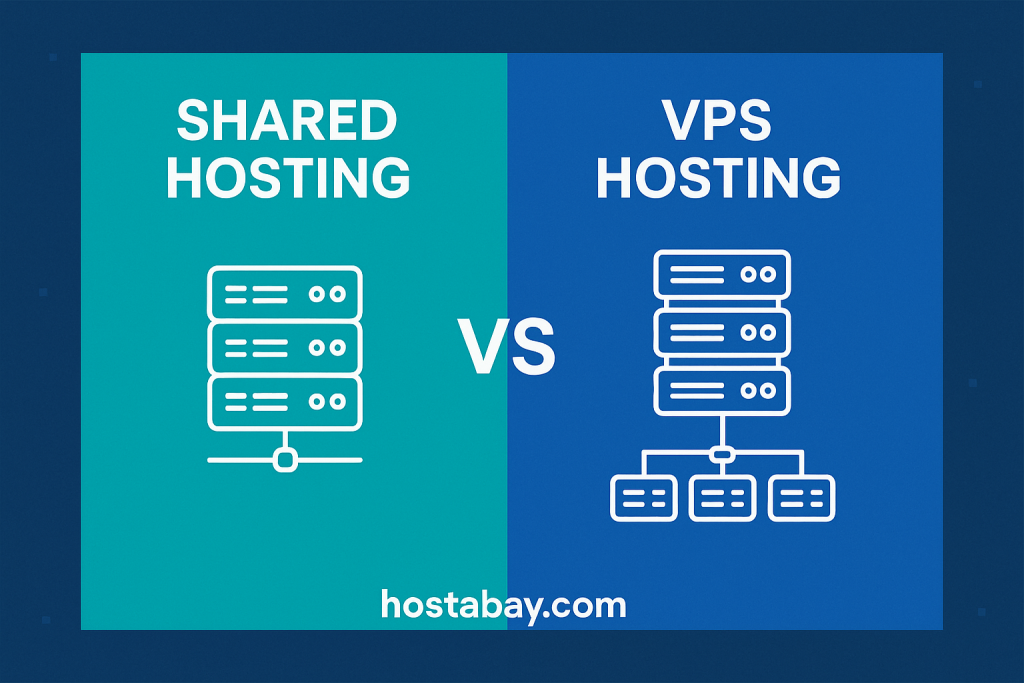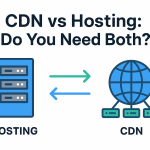Choosing the right foundation for your website is the single most important decision you’ll make, second only to the idea itself. The hosting service you select today directly determines your site’s speed, security, SEO ranking, and ability to handle future growth.
Unfortunately, many entrepreneurs and business owners fall into a common trap: they choose a hosting plan based only on the lowest price tag. This often leads to frustrating slowdowns, unexpected security issues, and costly migrations down the line.
The two main contenders for most websites are Shared Hosting and VPS Hosting (Virtual Private Server). They are priced differently, built differently, and designed for radically different goals.
We’re here to cut through the confusing acronyms and help you make a strategic choice that sets your website up for long-term success.
1. Shared Hosting: The Digital Hostel Room
Shared hosting is the entry-level plan for almost every website builder. It is the cheapest, simplest, and most beginner-friendly solution available.
The Concept: Shared hosting is exactly what it sounds like—your website shares one large physical server with dozens, sometimes hundreds, of other websites.
The Analogy: Think of shared hosting as renting a room in a bustling hostel.
- The Upsides: It’s incredibly cheap, the management (cleaning, repairs) is handled by the hostel owner (the host), and you can check in instantly. You have access to a basic common kitchen (control panel like cPanel).
- The Downside: You share everything—the bathroom (CPU), the kitchen (RAM), and the electricity (bandwidth). If your neighbor throws a massive party (a sudden traffic spike), everyone else suffers from the noise and the slow service.
Who is Shared Hosting Best For?
Shared hosting is the perfect starting line. It’s ideal for projects where budget is the main concern and traffic is predictably low:
- Personal Blogs and Portfolios: Small sites with less than 5,000 monthly visitors.
- Hobby Projects: Sites where a little downtime won’t impact revenue or reputation.
- Testing and Staging Environments: Places where you test code before deploying it elsewhere.
The Verdict: If you are a beginner, go with Shared Hosting. But understand that it is a stepping stone, not a destination.
2. VPS Hosting: Your Private Apartment in a Skyscraper
VPS Hosting is the first big leap in web infrastructure. It bridges the gap between the affordability of sharing a server and the power of having a dedicated machine.
The Concept: Through virtualization technology, a large physical server is partitioned into several smaller, entirely isolated virtual machines (VMs). Even though these VMs live on the same hardware, they operate independently.
The Analogy: VPS is like renting your own private apartment in a large complex.
- The Upsides: You have your own dedicated, guaranteed resources (a certain amount of RAM, CPU, and storage) that no one else can touch. Your neighbor’s party won’t affect your utilities. You have more control over your security, operating system, and software configurations.
- The Downside: It costs significantly more than the hostel room. If you choose a “self-managed” plan, you need some technical skill to handle server maintenance.
Who is VPS Hosting Essential For?
VPS is the required infrastructure for any website that serves customers, processes transactions, or has serious plans for growth:
- E-commerce Stores: You need guaranteed speed for checkout processes and security for customer data.
- Growing Medium-Sized Businesses: Corporate sites that rely on high uptime and fast loading times for professional image and lead generation.
- Agencies and Developers: Those who need control to host custom applications or manage multiple client websites securely and independently.
The Verdict: If your website makes you money, handles sensitive data, or experiences traffic spikes, the dedicated resources of a VPS are a non-negotiable investment.
3. The Core Distinction: Why Resource Isolation Changes Everything
The difference in cost (Shared typically $5–$15/month vs. VPS typically $20–$60+/month) is really the price of resource isolation.
| Feature | Shared Hosting | VPS Hosting | The Business Impact |
| Resources | Shared (Variable) | Dedicated (Guaranteed) | Guaranteed resources mean predictable performance and stability. |
| Security | Shared Vulnerabilities | Isolated Environment | A “bad neighbor” malware attack on another site won’t affect yours. |
| Performance | Affected by neighbors | Faster and more Stable | Direct relationship to conversion rates and lower bounce rates. |
| Customization | Very Limited (cPanel only) | Full Root Access | You can install specialized software, like custom caching or security firewalls. |
| Scalability | You must migrate to upgrade | Easy Resource Upscaling | You can instantly add more RAM or CPU to handle traffic spikes. |
When is it Time to Move? The Clear Signals
Starting on Shared Hosting is smart, but sticking with it past its usefulness is a mistake that costs you money, traffic, and reputation. You should prepare to upgrade to a VPS the moment you experience any of these two or more signs:
- Downtime and Errors: Your site frequently goes down or displays “503 Service Unavailable” errors, particularly during peak hours.
- Sluggish Load Times: Your pages consistently load slower than three seconds, even after optimization efforts.
- Out-of-Memory Errors: Plugins or essential functions crash due to the limited RAM allocation.
- Security Incidents: You experience a malware attack or notice a high number of vulnerability warnings due to the shared server environment.
- Exceeding Bandwidth: You constantly hit the bandwidth limits set by your host, resulting in a degraded user experience or overage fees.
If your hosting is causing problems, the small monthly savings are instantly negated by the loss of potential revenue and the cost of repairing your reputation.
4. Addressing the Cost Misconception: Price vs. Value
Many people are scared off by the higher price tag of VPS, but it’s critical to look at the total value proposition.
- Shared Hosting’s Hidden Costs: Initial $2.99/month deals often renew at $10–$15/month. Furthermore, you often have to pay extra for essential security tools, backups, and even basic email functionality. The cost of slow speed (lost sales) is the biggest hidden fee.
- VPS Hosting’s Real Value: While the entry price is higher, the reliability, dedicated resources, and security mean you spend far less time troubleshooting downtime. If you choose Managed VPS, the host handles the complex maintenance, giving you the power of VPS without needing the technical expertise.
Hostabay Tip: Never choose a VPS plan solely based on the price per month. Look for the guaranteed resource allocation (RAM and CPU cores) and the quality of customer support. The best investment is in a platform that guarantees performance and has an easy, built-in upgrade path for when your business inevitably expands.
The right hosting choice today is an investment in stability, security, and the future scalability of your online business. Choose the option that matches your ambition, not just your starting budget.


